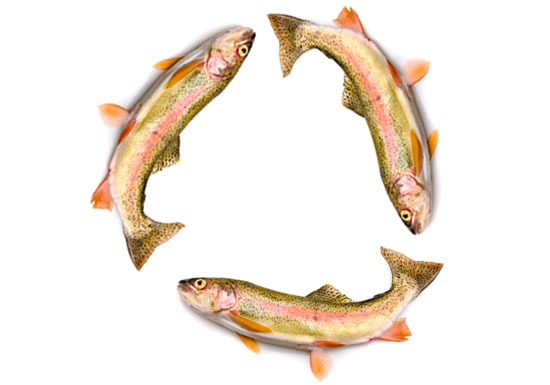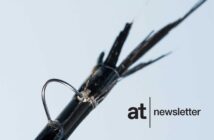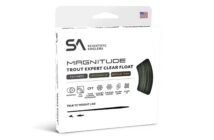
We’re getting a lot of positive feedback for introducing “opinion pages” in the print issues of Angling Trade. Many of you have commented on our last issue, which featured David Leinweber’s challenge to the industry on fly rod warranties, and Chuck Furimsky’s piece on guides “daisy chaining” runs in rivers. We are going to continue featuring opinions from industry members on hot topics in future issues, and encourage you to submit ideas directly to us at editor@anglingtrade.com.
Here is what Vail Valley, Colorado, guide Marc Barnwell had to add to the commentary on a common guide practice (for the original story click here):
Chuck, after reading your article, “Daisy Chaining for Trout,” I felt the need to respond. While I fully agree with your analysis that guides are engaging in this type of guiding, what I felt missing was the reason WHY, guides do this. The answer I believe is because it’s EASY. It’s easier for the client and for the guide, and it avoids having to completely re-rig a bird’s nest a few times (or hundred). I’m also seeing the trend of using switch rods to make it even EASIER. I’ve been guiding now for 17 seasons and a similar situation to what you described in Montana is happening here in Colorado. Just float down the Roaring Fork River on any summer day and watch the bobber fest happening. Guided fly fishing trips have simply come down to getting the client into fish rather than teaching them the art of the sport, no matter what’s going on in nature: “Get ‘em in and get ‘em out.” The easiest way to do this is to “lob the bob.”
Anyone reading this and familiar throwing dries knows it’s very difficult to teach newbies the art of casting (ie. what to do with your line hand, mending, false casting) before and as you float. By the time I have explained all of this, and they still can’t get it done (understandably), I could have been a quarter of the trip done by simply lobbing a bobber. But where’s the fun in that as a guide? Seriously where’s the fun watching an indicator the whole time, day in and day out? Big Boring Deal. Let’s face it guides, dry fly fishing is HARD for the newbie and landing a bunch of fish this way is simply not going to happen. I always tell my newbies getting one to the net is a good day. And don’t even get me started on streamer fishing a newbie from a boat…(Not going to happen!)
I see the following scenario all the time about someone wanting to learn the sport of fly fishing: A newbie calls or walks into a fly shop and says I’ve always wanted to try/learn fly fishing, and if you ask them to describe why they want to try the sport, they will describe the CAST. That is the draw. WE NEED TO TEACH THIS, as well as explain to them that a lot of the time fish simply won’t rise to a dry and the only way to catch them is to “dredge ‘em up” accordingly. I guarantee that newbie clients will remember catching their first fish on a dry more than nymph any day. Even the experienced or somewhat experienced prefer to at least try dries even if it means catching fewer fish. You have to give the client what they want.
While it may seem that I’m anti-dredging, I’m really not. There is a time, place and client need for it, but in the long run, having your clients lob full nymph rigs day in and day out is not serving them and is CERTAINLY NOT doing the sport of fly fishing justice. It’s just like anything else, you have to work for your reward. Let’s let newbies EARN catching lots of fish by learning and practicing. How sweet is it to have someone in your boat who can fish according to what’s happening in nature that day by throwing dries, dry dropper, nymphs or streamers (cautiously), and not worry about getting your fish quota for your clients? My guess is that this style of guiding will not affect tips negatively. My tips this past summer certainly did not seem to be impacted by the amount of fish brought to the net. If anything they went up.
Let’s let nature dictate what we throw on any given day, even if that means an extra half hour to hour devoted to teaching the cast, the heart of the sport.
Marc Barnwell, www.marcbarnwell.com




1 Comment
This is an interesting dialog, and as both an avid fly fisherman and a 40 year Montana fly fishing outfitter, I see merit and validity in both viewpoints. I’ve seen the “daisy chaining” or as I call it “recycling” in person on the Missouri and the Big Horn, and there is no question that it is a VERY effective method for catching trout. I have to admit that I’ve done this same thing myself a few times, but for me, personally, I find it tedious and a bit boring. Having said this, I don’t find fault in any of the guides who are utilizing this technique to help their clients catch fish. I also understand the frustration expressed by Mr. Furimsky. Since I started guiding in 1975, the sport of fly fishing has changed a lot, and one of the changes is the increased emphasis on “body count” which I believe has diminished the experience on the river. Also, as the number of guides, outfitters, clients and private anglers has increased, the bar for acceptable river etiquette has been lowered. There’s far more acrimony on many of our rivers today than there used to be. I don’t know that I have the silver bullet solution to this, but some of this could be helped if folks would simply talk to one and other. There’s very little, (almost none) communication between guides and anglers. It’s become bad form to talk to one and other, and I find that sad. I have to force myself to do it, but I do try and talk to folks on the river. For example, I came down a side channel on the Big Hole last spring during the salmon fly hatch, and to my surprise, I found two anglers wade fishing in a spot where there was no room to avoid them. They were waded into the river up to their waist and casting big salmon fly patterns at the far bank. With nowhere to go, I pulled the boat over to the bank and asked the guys if they’d mind holding off casting for a bit, and I’d walk my boat behind them. I think they expected me to just float on through the water they were trying to fish, and at first, they seemed a bit taken aback by my request. After a few moments, they said “sure”, took a couple of small steps out into the river, and I went behind them. They said “thank you.” Now, this wonderful little story isn’t going to solve this “daisy chain/recycling” issue for Mr. Furimsky or solve all the guide/angler conflicts that take place, but I would suggest that it is a starting point to solve some of these social conflict issues that, unfortunately, appear to be occurring more often.